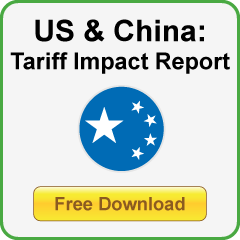Tariff Tracker: More Tariffs, Please
by Freedonia Focus Reports
September 14, 2018
As the trade war between the US and China heats up, the Trump administration is readying its next salvo: a 10% tariff rate on $200 billion worth of products.
Since the beginning, the cries of businesses and consumers that are or will be hurt by tariffs have been drowning out the smattering of applause from those enrichened by them.
Plastic Industry Offers Mixed Signals on Tariffs
For instance, the Plastics Industry Association has stated its “firm opposition” to tariffs on plastic products, materials, and machinery. Yet Pactiv, a prominent US manufacturer of plastic foodservice products, has publicly endorsed the Trump administration’s tariffs and requested surtaxes be applied to more goods and at higher rates. The company’s CEO, John McGrath, expressed as much during recent testimony before the Section 301 Committee of the US Trade Representative.
“[…] First, we voice our support specifically for the imposition of tariffs on thermoformed and injection molded packaging and lids… […] Second, we request that the USTR add tableware, including cutlery and cups […] to the list of items subject to the 301 investigation. Third, we welcome President Trump's decision to direct the USTR to consider increasing the proposed tariff rate from 10 percent to 25 percent. And strongly encourage the USTR to do so. […]”
Why? Location, location, location.
Importers of plastic cups, lids, and tableware from China are almost certain to pass some or all of the cost of the proposed tariff on to consumers as price increases. This would enhance the US industry’s competitive position and present an opportunity for increased profit margins.
Pactiv, as one might suspect at this point, manufactures primarily in the US, positioning it to win. Bigly.
Plasticware Consumers at Disadvantage in Trade War with China
Consumers, however, are positioned to lose.
For instance, the US imported $2.6 billion worth of plastic tableware in 2017, and China accounted for about 78% of those imports. Because the majority of US plastic tableware demand (about 55%) is met by Chinese products, any duties will impact much of the market, raising prices for consumers.
However, the impacts will be distributed unevenly, and companies may take a variety of actions to offset the tariffs. For example, companies can attempt to re-export Chinese goods to the US from a neutral country to dodge tariffs. Alternatively, businesses can assemble the components of a plastic item in China, then create the final product in a neutral country to substantially change it, thus avoiding the tariffs. While the tariffs will hurt importers, plasticware companies with domestic manufacturing facilities will become more competitive as low-cost suppliers utilizing the inexpensive value chain from China suffer the effects of the surtax. The tariffs will force importers to raise prices instead of reduce costs since profit margins are slim in the plastic tableware industry. Furthermore, since many plastic tableware products largely compete on price, importers risk losing market share if they increase prices because consumers likely won’t be willing to pay more for plastic tableware.
Most companies have suggested that tariffs will ultimately increase costs for US consumers, and so they oppose the tariffs. However, for a few well-positioned companies with manufacturing facilities based in the US, a trade war could be just the thing they need to increase their competitiveness in the plastic products market.
To Learn More
For more information on tariffs and the markets they'll impact the most, download the Freedonia Group's white paper "US & China: Tariff Impact Report", featuring insights and analysis from our industry experts.
About the Author:
Freedonia Focus Reports publishes short-format market research reports that provide reliable, unbiased insights on a wide variety of markets and industries. The Focus Reports collection comprises over 600 topics across two major geographic collections and several industry verticals.
Have unique research needs?
Freedonia Custom Research listens intently to your needs and objectives. Then we work diligently to define and deliver a service to meet them.Subscribe to Our Blog
Stay up to date with the latest information about new market research and news in areas relevant to your business from our analysts and team members.Freedonia Group Blog Subscription
Provide the following details to subscribe.
